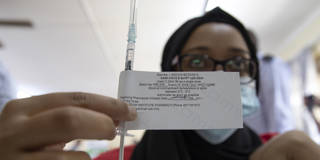Even after two years of the pandemic, the needs of people in poorer countries, and Africans in particular, remain an afterthought for leading global health authorities. The US Food and Drug Administration’s recent tightening of restrictions on the Johnson & Johnson COVID-19 vaccine is yet another example of this.
LONDON – The United States Food and Drug Administration’s recent decision to limit the use of the Johnson & Johnson COVID-19 vaccine to adults who cannot or will not get another vaccine will have profound consequences for African countries. The FDA said its move reflected the risk that the vaccine might cause a rare blood-clotting syndrome. But the decision shows that, even after two years of the pandemic, the needs of people in low- and middle-income countries, and Africans in particular, remain an afterthought for leading global health authorities.
The FDA’s restriction is not based on new evidence, but rather reflects an abundance of caution in a country with a relatively high COVID-19 vaccination rate and widely available alternative vaccines. The US has vaccinated more than 65% of its population against COVID-19, predominantly with Pfizer and Moderna vaccines. Only 8% have received the J&J vaccine. So, the FDA’s decision will have little material impact in America.
In Africa, on the other hand, the J&J vaccine is widely used. According to analysis from the Tony Blair Institute for Global Change, 42 million J&J doses have been administered in African countries so far. The fact that it requires only a single shot makes it well-suited to the logistical and capacity constraints of many poorer countries, and it is the vaccine of choice across much of the continent.

LONDON – The United States Food and Drug Administration’s recent decision to limit the use of the Johnson & Johnson COVID-19 vaccine to adults who cannot or will not get another vaccine will have profound consequences for African countries. The FDA said its move reflected the risk that the vaccine might cause a rare blood-clotting syndrome. But the decision shows that, even after two years of the pandemic, the needs of people in low- and middle-income countries, and Africans in particular, remain an afterthought for leading global health authorities.
The FDA’s restriction is not based on new evidence, but rather reflects an abundance of caution in a country with a relatively high COVID-19 vaccination rate and widely available alternative vaccines. The US has vaccinated more than 65% of its population against COVID-19, predominantly with Pfizer and Moderna vaccines. Only 8% have received the J&J vaccine. So, the FDA’s decision will have little material impact in America.
In Africa, on the other hand, the J&J vaccine is widely used. According to analysis from the Tony Blair Institute for Global Change, 42 million J&J doses have been administered in African countries so far. The fact that it requires only a single shot makes it well-suited to the logistical and capacity constraints of many poorer countries, and it is the vaccine of choice across much of the continent.